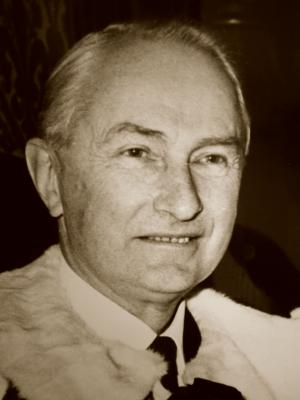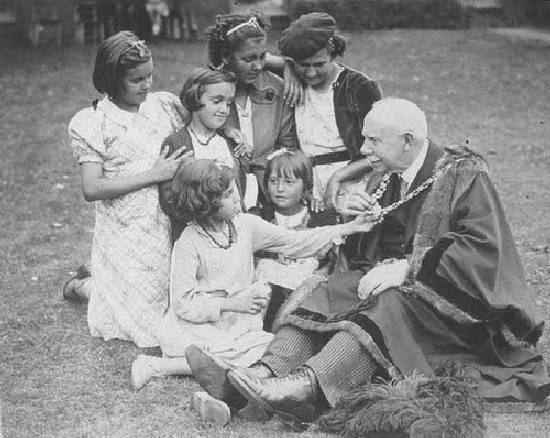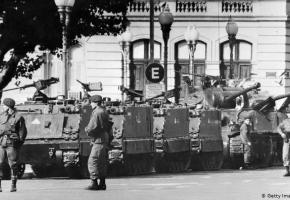Tourists may be forgiven for not noticing the hamlet of Eaton Hastings, a collection of cottages on the Buscot Estate, situated south-west of Oxford, on the road between Faringdon and Lechlade. But it is here that Lord Faringdon, one of the jeunesse doréeportrayed by Evelyn Waugh in his novelBrideshead Revisited, wrote his little piece of England into Spanish Republican history.
Buscot Park and its 18th century mansion were acquired in 1889 by the Scottish financier and railway magnate Alexander Henderson, who in 1916 was ennobled as the first Baron Faringdon. His grandson Gavin was educated at Eton and Christ Church, Oxford, where in 1924 he emerged with 4th class honours in Modern History and a reputation for somewhat effete frivolity. By the time he inherited his grandfather’s title and estates in 1934, however, he had been converted to socialism and pacifism. On the outbreak of the Spanish war he joined a British field hospital in Aragón, and one of his Rolls Royces was adapted for use there as an ambulance. Back in England he was one of the founders of the National Joint Council for Spanish Relief.
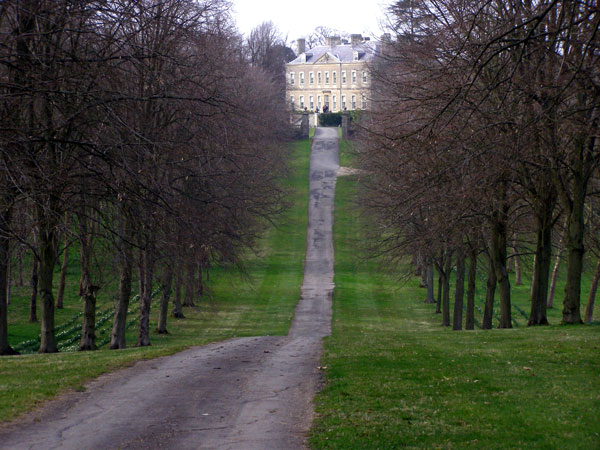
On 20 May 1937 some four thousand Basque children were evacuated from Bilbao on an old cruise liner commissioned by this Council, which set up a committee to organise the exodus and its reception. The ship reached Southampton on 22 May 1937, and all the children were taken to a vast tented camp nearby. In spite of the efforts of the British volunteer care workers – members of the Labour party, the Society of Friends (Quakers), Women’s Institutes, and the Boy Scout movement, among others – the children were profoundly disorientated.
When the news of the fall of Bilbao was broken to them without warning on 19 June there was a fearful eruption of grief and despair. Some of the older boys broke out of the camp and headed for Southampton docks in the hope of finding a passage home, to join their families. Some of these so-called niños were in fact teenagers old beyond their years, who had shouldered men’s responsibilities and had seen death and destruction at first hand. In England they found themselves treated as children and subjected to an institutional discipline which was alien to them. The authorities found them ‘difficult’. Many were highly politicised.
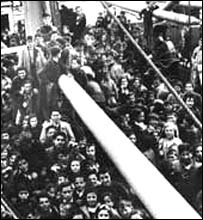
A surviving aerial photograph shows that the encampment at Southampton was segregated according to political affiliation: one section for the children of Communists and Anarcho-Syndicalists, another for Socialists, and a smaller one for the children of Catholic Nationalists. When the children were dispersed, a group of boys sent to Sheffield alarmed their hosts on their first drive through the city by cheering every time the traffic lights turned red!
Between June and September 1937 nearly all the children were settled in some seventy ‘colonies’ scattered throughout the United Kingdom. One of the unsung heroines of this story, Poppy Vulliamy, took a group of so-called ‘difficult’ boys under her wing and, after finding them only a temporary home near Yarmouth, approached Lord Faringdon . She told him with characteristic forthrightness that as a Socialist he should not be living all by himself in his big mansion but should be sharing it with the homeless. Lord Faringdon was not quite ready to go that far, he did make available a lodge on his estate, in the hamlet of Eaton Hastings, and here the colony established itself before the end of March 1938.
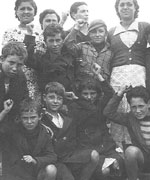
On 27 March one of the boys, José Sobrino, died at the Radcliffe Infirmary, Oxford, and his death certificate gave his address as ‘Basque House, Eaton Hastings’. It was this event which inspired the exiled poet to write his ‘Elegía a un muchacho vasco, muerto en Inglaterra’ (Ode on the Death of a Basque Boy in England).
Luis Cernuda had arrived in England in February at the invitation of Stanley Richardson, a young Cambridge-educated poet who had been attached to the same field hospital in Aragón as Lord Faringdon. Richardson was well connected in the social and literary worlds, and organised a reception for his friend attended by such well known figures as the Duchess of Atholl, a Tory MP, and yet branded ‘the Red Duchess’ for her vehement campaigning to warn British politicians of the dangers of fascism in Europe.
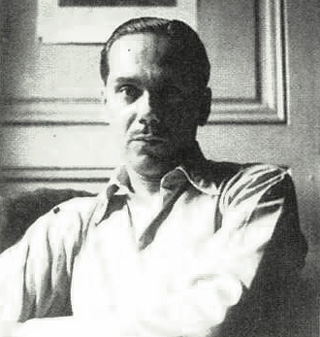
With the best of intentions, Richardson approached his friend Lord Faringdon and came up with the idea that Cernuda should join the colony at Eaton Hastings as a teacher. The idea was doomed to fail. The job called for a cheerful, sporty extrovert, and Cernuda was certainly not that, nor was he psychologically prepared for rural isolation in cramped quarters.
The story behind the Elegía as told by the poet’s confidant Rafael Martínez Nadal is unforgettable:
"He was a boy of fourteen or fifteen, apparently brilliant at school. His name was José Sobrino but they called him Iñaki. He learned English in no time, and was so quick in class that Lord Faringdon offered to send him to a good private school and pay all his fees. The boy refused: 'My father worked in the steel works of Bilbao, and I'll be a steel worker too'. He would probably have accepted in the end if his fate had not intervened. Luis Sobrino, Jose's slightly younger brother, long remembered with emotion the natural fortitude with which he said goodbye the night before he died. He had asked for "Señor Cernuda" to come and see him. During the visit, the boy spoke very little, but admitted how lonely he had felt and asked the poet to recite a poem. When Cernuda finished, the boy said: "Now, please, don't leave but I am going to turn to the wall so you don't see me die." Cernuda and the nurse thought it was a macabre joke. Seconds later there was a long sigh. The boy had died."
The boy was buried in an unmarked grave at Rose Hill cemetery, Oxford, on 13 April, at a simple ceremony attended by his comrades. Martínez Nadal’s claim that, had Iñaki lived, he would have accepted Lord Faringdon’s proposal to have him educated at a private school is difficult to believe, given the boy’s intense pride, independence of character and loyalty to his family and to his class. Cernuda´s awe of these characteristics and the boy´s bravery are evident in his Ode:
You drank down your death,
The death they had in store for you,
In one long single draught,
Without for an instant looking back,
Just like a man in close combat.
A vast indifference came upon you
Before the earth could close over you.
"After what I have seen", Cernuda told Martínez Nadal, "I will never go back to a children’s home". The young Spanish intellectual, however, was one of many “extraordinary people” who, according to surviving niño Herminio Martinez “gave us an education that was in many ways unique,” despite the group´s continual disruption. Among those Martinez remembered in a thank you in speech given at the 70th anniversary of their arrival in Southampton in 2007, was Luis Portillo, a professor of Law at Salamanca University, and father of Michael Portillo, the television pundit and ex-Tory MP.
Most impregnated on the minds of the niños vascos, however, were women, such as Poppy Vulliamy and the Duchess of Atholl, who “devoted years to our welfare.” At the other end of the political spectrum to Poppy Vulliamy, the Duchess of Atholl was “An extraordinary person, (who) presented a copy of Mein Kampf to each member of the cabinet so that they should be in no doubt as to what Hitler stood for.”
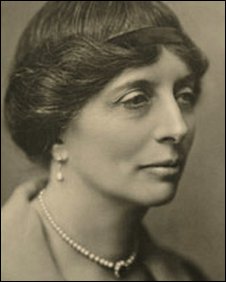
Another woman “always mentioned with affection and respect by the children", according to Martinez, was Mrs Somerset, who worked in a number of colonies. "She had a five year old son. While playing with some of the children, he was hit on the head by a swing and was killed. All the children were terribly distressed. Mrs Somerset comforted them to reassure them that this had been an accident. This, while dealing with her own sorrow."
In January 1939, the Basque Boys moved on from Eaton Hastings and, in a farewell party, Lord Faringdon expressed the hope that the boys would return after the defeat of the Fascists to build a new Spain, ‘with vigour, and a social consciousness fortified by their stay in England’. Another speaker declared that if help had been given, it was given not in a spirit of charity but as a duty, in the knowledge that the Spanish people were fighting not only for themselves, but for ‘us in Britain’, in the front line of the battle for freedom and democracy#. In fact, by that time the battle had been lost, and many of the boys would not return to Spain until years later.
